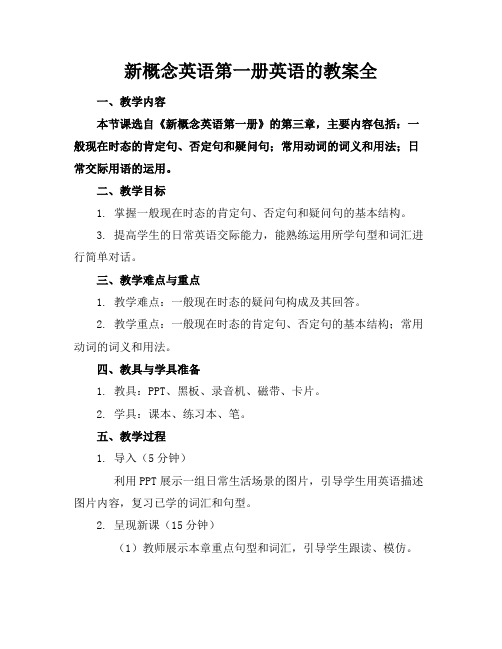新概念英语备课教案
- 格式:doc
- 大小:41.50 KB
- 文档页数:6

2024年新概念第一册教案完整版全新版本一、教学内容本节课选自2024年新概念第一册教材,具体内容包括第三章“一般现在时与一般过去时”的第一至第三节。
详细内容主要涉及一般现在时和一般过去时的基本概念、构成形式以及它们在不同场景下的应用。
二、教学目标1. 让学生掌握一般现在时和一般过去时的基本概念,并能够辨别两种时态。
2. 培养学生运用一般现在时和一般过去时进行句子构建的能力。
3. 提高学生运用两种时态描述日常生活场景的实践能力。
三、教学难点与重点教学难点:一般现在时与一般过去时的区分及运用。
教学重点:一般现在时与一般过去时的基本概念、构成形式以及在不同场景下的应用。
四、教具与学具准备教具:PPT、黑板、粉笔、教学卡片。
学具:笔记本、教材、练习册。
五、教学过程1. 导入(5分钟):通过展示一组描述日常生活场景的图片,引导学生用中文描述图片内容,进而引出英语中描述不同时间发生的动作需要用到不同的时态。
2. 新课内容讲解(15分钟):详细讲解一般现在时和一般过去时的基本概念、构成形式,并通过例句展示两种时态在实际应用中的区别。
3. 例题讲解(15分钟):分析教材中的典型例题,让学生理解并掌握一般现在时和一般过去时的用法。
4. 随堂练习(10分钟):发放练习册,让学生独立完成与新课内容相关的练习题,巩固所学知识。
六、板书设计1. 一般现在时的概念、构成形式及例句。
2. 一般过去时的概念、构成形式及例句。
3. 一般现在时与一般过去时的异同点。
七、作业设计1. 作业题目:(1)请用一般现在时和一般过去时各写五个句子,描述你的日常生活。
(2)教材第三章第一至第三节课后练习题。
答案:(1)一般现在时:I get up at 7:00 every morning. I go to school bus. I like reading books. I have lunch at school. I do my homework in the evening.一般过去时:I visited my grandparents last weekend. I played football with my friends yesterday. I watched a movie last night. I ate a delicious dinner with my family. I finished my homework at 9:00 p.m.(2)见教材课后答案。

新概念英语教案教案目标: 通过学习新概念英语,学生能够掌握基本的英语语法知识、词汇及听力能力。
并且能够用英语进行简单的交流。
一、教学内容本节课教材是《新概念英语》第一册第一课,主要内容是介绍英语的学习方法和学习技巧。
二、教学目标1. 通过学习本节课的内容,学生能够掌握新概念英语的学习方法和学习技巧。
2. 学生能够听懂并理解英语的基本语法规则和词汇。
3. 学生能够用基本的英语进行简单的交流。
三、教学重点1. 学习新概念英语的学习方法和学习技巧。
2. 学习英语的基本语法规则和词汇。
四、教学准备1. 教材《新概念英语》第一册第一课录音机、光盘和单词卡片。
2. 教学课件。
五、教学过程Step1. 观看教学视频首先播放一段介绍新概念英语学习方法和学习技巧的视频。
视频内容包括:第一,了解自己的英语能力水平,根据自己的实际情况选择适合的教材和学习方式。
第二,培养良好的听力习惯,多听多训练。
第三,掌握基本的英语语法规则,通过词汇和句子的学习提高语感。
第四,多进行口语练习,提高英语口语能力。
Step2. 听读教材播放《新概念英语》第一册第一课的录音,并同时展示教材的文字内容。
教师将重点句子及单词标注在黑板上,边听边读,学生跟读。
Step3. 单词练习教师出示单词卡片,学生分组进行单词认读。
每轮出示5个单词,学生分组接力认读,每个单词只给予5秒钟的时间。
组内完成后,教师点评并帮助学生纠正发音错误。
Step4. 语法讲解教师用图示和动作示范的形式进行英语基本语法的讲解,重点包括:主谓一致、动词的时态、名词的单复数等。
教师用简单的例子让学生理解和记忆,并给予学生练习。
Step5. 句子练习教师出示若干句子,学生根据所学的英语基本语法知识进行分析和翻译。
教师进行点评并帮助学生解答问题。
Step6. 学生练习学生分组进行角色扮演练习,每组分配一份对话文本,学生根据文本内容进行对话练习。
教师鼓励学生运用已学的英语基本语法知识进行交流,并给予积极鼓励和反馈。

新概念英语教学设计一、教学目标:1.能够理解和运用新概念英语课程教材中的常见词汇和句型;2.能够进行简单的对话和交流;3.能够正确运用基本语法规则进行阅读和写作。
二、教学内容:1. 新概念英语第一册课程教材(Unit 1-6)中的常见词汇、句型和语法规则;2.与课本相关的听力、口语、阅读和写作练习。
三、教学过程:第一周:1.教师引导学生进行新课前导入,通过图片和单词卡片等教具,呈现本周的主题词汇。
并通过模仿、师生问答等方式,帮助学生掌握这些词汇的发音和基本用法。
2.随后,教师展示课文并朗读。
学生在教师的指导下进行听力练习,通过跟读和模仿教师的发音,提高他们的听力和口语能力。
第二周:1.学生展示他们在第一周学到的词汇和句型,通过分组活动进行口语练习。
每个小组选择一个话题进行对话,并且每个人都要积极参与讨论和交流。
2.教师进行语法讲解,重点介绍本单元的重点语法规则。
通过实例讲解和练习来帮助学生掌握语法规则的应用。
第三周:1.教师设计一篇与课文相关的阅读材料,并提供相关的问题和练习。
学生在教师的指导下进行阅读,然后回答问题和展开讨论。
2.学生根据所学内容,进行写作练习。
可以是对话的练习、书面表达或者简短的日记等。
教师给予适当的指导和评价。
第四周:1.学生进行听力练习,教师按照课文内容设计听力材料。
学生在听力材料结束后回答问题,教师进行评估和反馈。
2.学生展示他们的写作作品,教师进行评价和指导。
并就学生的学习情况进行总结,提供进一步的学习建议。
四、教学评估:1.教师通过观察学生的课堂表现和作业完成情况来评估他们在听力、口语、阅读和写作方面的能力。
2.在每个单元结束后,教师可以进行小测验,考察学生对所学知识的理解和掌握程度。
3.教师可以对学生进行口语评测,通过模拟日常情境,测试学生在实际交流中的口语能力。
五、教学资源:1.教师准备课件和PPT来辅助教学;2.学生有课本和练习册作为学习资料;3.教师提供相关的听力材料和阅读材料。

新概念英语第一册英语的教案全一、教学内容本节课选自《新概念英语第一册》的第三章,主要内容包括:一般现在时态的肯定句、否定句和疑问句;常用动词的词义和用法;日常交际用语的运用。
二、教学目标1. 掌握一般现在时态的肯定句、否定句和疑问句的基本结构。
3. 提高学生的日常英语交际能力,能熟练运用所学句型和词汇进行简单对话。
三、教学难点与重点1. 教学难点:一般现在时态的疑问句构成及其回答。
2. 教学重点:一般现在时态的肯定句、否定句的基本结构;常用动词的词义和用法。
四、教具与学具准备1. 教具:PPT、黑板、录音机、磁带、卡片。
2. 学具:课本、练习本、笔。
五、教学过程1. 导入(5分钟)利用PPT展示一组日常生活场景的图片,引导学生用英语描述图片内容,复习已学的词汇和句型。
2. 呈现新课(15分钟)(1)教师展示本章重点句型和词汇,引导学生跟读、模仿。
(2)通过例句讲解,让学生理解并掌握一般现在时态的肯定句、否定句和疑问句的构成。
(3)教师组织学生进行小组活动,用所学的句型和词汇进行对话练习。
3. 实践情景引入(10分钟)教师创设一个日常生活中的场景,如:在餐馆点餐,让学生分角色扮演,运用所学知识进行情景对话。
4. 例题讲解(10分钟)(1)讲解一般现在时态的肯定句、否定句和疑问句的用法。
(2)通过例题,让学生进一步巩固所学知识。
5. 随堂练习(15分钟)(1)教师发放练习题,让学生独立完成。
(2)教师对答案进行讲解,纠正学生的错误。
(2)布置课后作业。
六、板书设计1. 一般现在时态的肯定句、否定句和疑问句结构。
2. 本节课所学的常用动词及其词义。
七、作业设计1. 作业题目:请用一般现在时态描述你每天的生活作息。
2. 答案示例:I get up at 6:30 every morning. I have breakfast at 7:00. Then I go to school at 7:30.八、课后反思及拓展延伸1. 反思:关注学生对一般现在时态的理解和应用,及时发现并解决学生的问题。

新概念英语第一册教案教案标题:新概念英语第一册教案一、教学目标:1. 能够流利地读、理解和运用课文中的生词和短语。
2. 能够正确地运用课文中的句型进行口头和书写表达。
3. 能够准确地使用所学的语法知识,如一般现在时、冠词等。
二、教学重点:1. 生词和短语的理解和运用。
2. 句型的正确运用。
三、教学难点:1. 句型的正确运用。
2. 语法知识的准确运用。
四、教学过程:Step 1: 导入新课(5分钟)1. 向学生简单介绍并解释本节课将要学的内容。
2. 引导学生思考是否有了解过新课中的一些词汇和短语。
Step 2: 学习新课文(20分钟)1. 听录音并跟读。
2. 逐句解释课文,并帮助学生理解其中的生词和短语。
3. 读课文并让学生回答与课文内容相关的问题。
Step 3: 语法讲解(10分钟)1. 简单介绍一般现在时的用法和形式。
2. 让学生进行一般现在时的句子实操。
Step 4: 练习活动(15分钟)1. 让学生进行口头练习,模仿课文中的对话。
2. 给学生发放练习纸,并让他们进行书写练习。
Step 5: 拓展学习(5分钟)1. 引导学生思考一般现在时在实际生活中的应用场景。
2. 以班级为单位进行语言交流活动,演绎一些使用一般现在时的情景对话。
五、作业布置(5分钟)1. 布置用一般现在时写一篇短文的作业。
2. 鼓励学生积极参与课堂互动,勤于思考。
六、板书设计:New Concept English Unit 1Lesson 1一般现在时七、教学反思:本节课是新概念英语第一册的第一课,主要通过讲解课文、讲解语法知识和进行练习活动等多种教学手段,让学生掌握和运用一般现在时的用法和形式。
通过听、说、读、写等多种方式,培养学生的语言综合能力,提高他们的听力、口语、阅读和写作水平。
同时,通过组织学生之间的语言交流活动,增强学生对一般现在时的使用能力,在实际生活中能够更加自如地使用所学内容。
合理安排教学内容和教学活动,能够激发学生的学习兴趣,提高他们的学习效果。

新概念英语教学教学教案新概念英语教学教案Introduction:本教学教案旨在提供一种有效的教学方法,以帮助学生学习新概念英语课程。
本教案根据新概念英语教学教材的特点和学生的需求,设计了一系列教学活动和评估方式,以促进学生的听、说、读、写能力的综合提高。
Section 1: 课程概述1.1 课程背景介绍新概念英语是一套专为非母语学习者开发的英语课程教材,旨在帮助学生从基础开始逐步提高英语能力。
本教案旨在根据新概念英语教材的内容,设计适合学生掌握的教学活动。
1.2 学习目标- 培养学生对英语听力、口语、阅读和写作的兴趣与能力- 通过教学活动提高学生的英语交际能力- 培养学生的独立思考和解决问题的能力1.3 教学重点- 发展学生的英语听力和口语表达能力- 培养学生的阅读和写作技巧- 提供实际语言运用的机会,增强学生的沟通能力Section 2: 教学方法2.1 激发学生学习兴趣通过介绍有趣的话题、展示多媒体资源、进行小组合作和角色扮演等方式,激发学生学习英语的兴趣。
2.2 听说读写的综合训练设计各种教学活动,包括听力训练、口语表达、阅读理解和写作练习,以帮助学生全面提高英语能力。
2.3 引导学生自主学习通过提供学习资源和引导学生探索学习,在教师指导下,鼓励学生独立思考和解决问题。
Section 3: 教学活动安排3.1 Unit 1: Learning a New Language- 学习目标:了解学习新概念英语的目的和方法- 教学活动:- 介绍新概念英语的教材特点和学习方法- 分组讨论学习英语的重要性和挑战- 角色扮演:学生扮演英语老师和学生,模拟真实的教学环境3.2 Unit 2: Sounds and Words- 学习目标:学习英语的基本发音和单词- 教学活动:- 听力训练:使用录音材料,练习辨别不同的发音- 口语练习:学生进行单词发音和会话练习- 词汇扩展:学生通过拓展词汇表,进行词汇运用练习3.3 Unit 3: People and Places- 学习目标:学习描述人物和地点的表达方式- 教学活动:- 阅读理解:学生阅读教材中的文章,回答相关问题- 口语练习:学生通过小组讨论,描述人物和地点- 写作练习:学生根据教材提供的提示,撰写一篇关于自己喜欢的地方的短文Section 4: 教学评估4.1 听力和口语评估通过听力训练和口语练习中的教师观察和学生表现,评估学生的听力和口语能力。
新概念英语备课教案一、教学目标1. 知识目标:(1)掌握本课的生词和短语;(2)理解课文的主要内容;(3)掌握课文的语法和句型。
2. 能力目标:(1)能够运用所学知识进行日常交流;(2)能够听懂并模仿课文中的语音和语调;(3)能够独立完成课后练习。
二、教学内容1. 课文:新概念英语第二册Lesson 1-Lesson 5;2. 生词和短语:按课文顺序列出Lesson 1-Lesson 5中的生词和短语;3. 语法和句型:分析并讲解Lesson 1-Lesson 5中的语法和句型。
三、教学重点与难点1. 重点:课文内容的掌握,生词和短语的学习,语法和句型的应用;2. 难点:生词和短语的理解和运用,语法的准确运用,语音和语调的模仿。
四、教学方法1. 任务型教学法:通过完成各种任务,让学生在实践中学习和应用英语;2. 情景教学法:创设真实的语境,让学生在交流中学习和应用英语;3. 视听教学法:利用多媒体教学资源,提高学生的学习兴趣和效果。
五、教学步骤1. 热身(5分钟):通过简单的口语交流,激活学生的英语思维;2. 课堂讲解(20分钟):讲解课文内容,生词和短语,语法和句型;3. 课堂练习(15分钟):通过各种练习,让学生巩固所学知识;4. 小组活动(15分钟):学生分组进行交流,运用所学知识进行实际应用;5. 课后作业(布置作业,让学生巩固所学知识)。
六、教学评价1. 形成性评价:在教学过程中,通过观察、提问、讨论等方式,及时了解学生的学习情况,给予鼓励和指导;2. 终结性评价:课后布置适量作业,检测学生对课文内容、生词短语和语法句型的掌握情况。
七、教学资源1. 教材:新概念英语第二册;2. 多媒体资源:课件、视频、音频等;3. 网络资源:相关英语学习网站、APP等。
八、教学进度安排1. 课时:每课时100分钟;2. 教学进度:每周完成一个Lesson,共15周完成全部教学内容。
九、教学反思1. 反思教学内容:根据学生的学习情况,调整教学内容,确保学生能够扎实掌握;2. 反思教学方法:根据学生的反馈,调整教学方法,提高教学效果;3. 反思教学评价:根据学生的学习进度,调整评价方式,确保评价的公正性和准确性。
新概念英语第一册英语教案全一、教学内容本节课选自新概念英语第一册,具体章节为Chapter 3,内容包括一般现在时态的使用,日常交流中的基本句型,以及常用单词和短语的介绍。
二、教学目标1. 掌握一般现在时态的用法,并能运用到实际交流中。
2. 学会使用常用的日常交流句型,提高口语表达能力。
3. 扩大词汇量,掌握本节课所学的单词和短语。
三、教学难点与重点1. 教学难点:一般现在时态的运用,尤其是主语为第三人称单数时动词的变化。
2. 教学重点:常用日常交流句型的掌握,以及单词和短语的学习。
四、教具与学具准备1. 教具:PPT、黑板、录音机、磁带。
2. 学具:课本、练习册、笔记本、彩色笔。
五、教学过程1. 实践情景引入(5分钟)利用PPT展示一组日常生活场景,引导学生观察并提问:“What do they do every day?”让学生尝试用英语回答,引入本节课的主题。
2. 例题讲解(15分钟)讲解一般现在时态的用法,通过例句展示,让学生理解和掌握主语为第三人称单数时动词的变化规律。
3. 随堂练习(10分钟)根据PPT上的句子,让学生完成一般现在时态的填空练习,巩固所学知识。
4. 单词和短语学习(10分钟)逐个讲解本节课所学的单词和短语,让学生跟读,并注意发音。
5. 对话练习(15分钟)分组让学生进行角色扮演,运用所学句型和单词进行对话练习。
6. 课堂小结(5分钟)七、作业设计1. 作业题目:(1)完成练习册上的课后练习;(2)用一般现在时态写一段话,描述自己的日常生活。
2. 答案:(1)见练习册;八、课后反思及拓展延伸1. 课后反思:关注学生在课堂上的参与度,及时发现和解决学生在学习过程中遇到的问题。
2. 拓展延伸:(1)鼓励学生在日常生活中多使用英语进行交流;(2)推荐学生观看英语动画片、电视剧,提高英语听说能力;(3)引导学生参加英语角等课外活动,拓展英语学习渠道。
重点和难点解析1. 教学难点:一般现在时态的运用,尤其是主语为第三人称单数时动词的变化。
新概念英语第一册英语精品教案全一、教学内容二、教学目标1. 学生能够听懂并熟练运用本节课所学的介绍人物和物品的表达方式。
2. 学生能够在实际场景中进行简单的英语对话,介绍自己及周围的人或物品。
3. 学生能够正确书写和拼读本节课所学的单词和句子。
三、教学难点与重点教学难点:介绍人物和物品的表达方式,以及相关单词的拼写和发音。
教学重点:熟练运用所学表达方式,进行简单的英语对话。
四、教具与学具准备教具:PPT、黑板、教学卡片。
学具:学生用书、练习册、文具。
五、教学过程1. 导入:通过PPT展示不同人物和物品的图片,引导学生用中文进行介绍,进而引出本节课的主题。
2. 新课内容:讲解和演示本节课所学的表达方式,如"This is",同时教授相关单词,如"boy"、"girl"、"pen"等。
3. 实践情景:分组让学生进行角色扮演,用英语介绍自己及组内成员,锻炼学生的口语表达能力。
4. 例题讲解:针对本节课的重点句型和单词,给出例题并进行讲解。
5. 随堂练习:让学生完成练习册上的相关题目,巩固所学知识。
六、板书设计1. 《This is》2. 主要内容:重点句型:This is相关单词:boy、girl、pen、pencil、book、bag等3. 例题及答案七、作业设计1. 作业题目:(1)用英语介绍自己的家庭成员,不少于5句话。
(2)根据所给图片,用英语介绍物品,不少于5句话。
2. 答案:(1)This is my father. He is a teacher.This is my mother. She is a doctor.This is my brother. He is a student.This is my sister. She is in primary school.This is my grandpa. He is retired.(2)This is a pen. It is blue.This is a pencil. It is yellow.This is a book. It is red.This is a bag. It is black.This is a ruler. It is transparent.八、课后反思及拓展延伸1. 课后反思:关注学生在课堂上的表现,了解他们在学习过程中的困难和问题,以便进行针对性的辅导。
2024年新概念英语第一册标准教案完整版一、教学内容本节课选自2024年新概念英语第一册,具体包括第三章《A New House》和第四章《Meeting New People》。
详细内容主要围绕描述新房子和介绍新朋友展开,让学生掌握一般现在时和一般过去时用法,以及相关词汇和句型。
二、教学目标1. 让学生掌握一般现在时和一般过去时用法;2. 让学生熟练运用描述房子和人物特征词汇;3. 培养学生听说读写综合运用能力;4. 培养学生团队合作意识和交流能力。
三、教学难点与重点1. 教学难点:一般现在时和一般过去时区别与运用;2. 教学重点:描述房子和人物特征词汇和句型。
四、教具与学具准备1. 教具:PPT、黑板、卡片、录音机;2. 学具:课本、练习册、笔、纸。
五、教学过程1. 实践情景引入(5分钟)播放一段关于描述新房子和介绍新朋友视频,引导学生关注并思考视频中语言表达;2. 例题讲解(10分钟)讲解一般现在时和一般过去时用法,并通过例句展示;分析描述房子和人物特征词汇和句型,让学生进行模仿和练习。
3. 随堂练习(15分钟)学生两人一组,运用所学词汇和句型进行对话练习;教师巡回指导,纠正错误,解答疑问。
4. 小组活动(10分钟)学生四人一组,根据教师提供场景,编写对话并进行表演;各组展示成果,教师点评并给予鼓励。
教师带领学生回顾本节课所学内容,巩固知识点;拓展延伸,让学生尝试运用所学知识描述其他场景和人物。
六、板书设计1. 《A New House》&《Meeting New People》;2. 主要内容:一般现在时和一般过去时用法,描述房子和人物特征词汇和句型;3. 示例句型:This is my new house. It has three bedrooms and two bathrooms. / I met a new friend today. His name is Tom.七、作业设计1. 作业题目:根据所学内容,编写一段描述自己家对话;描述一位新朋友外貌和性格特点。
新概念英语备课教案 : (总课时45分钟)lesson 47 A cup of coffeePartⅠ问候及引课:(总计约4分钟时间)Good afternoon ,every one! Let’s learn today’s lesson together , please open your book ,turn to page 93(停顿等待把书打开) , lesson 47 ,A cup of coffee ,一杯咖啡。
Are you all ready ?First ,let’s look at the picture on the left ,then tell me ,what are they doing ?首先我们来看93页右边的图片,您认为图中两位女士在做什么?(先不请学生回答,继续引导学生看图并思考)。
我们来看第一副图,图中左边的女士手里拿着一个冒着热气的壶,桌子上面放了一些杯子和一盘点心,对着右边的女士在说些什么!接着再看第二副图,左边的女士递了一杯什么(题目是咖啡,我们可以想象这杯子里盛的是咖啡)给右边的女士,接下来的四副图片呢都是左边的女士在给右边的女士递一些吃的喝的之类的东西,我们可以想象这是家里来了客人,主人在招待课人的一个情景对话。
那我们由此也得知,图中两位女士在喝咖啡吃点心(回答了上面的问题,问学生对不对,带动学生一起进行思考)。
那为了验证我们的猜想是否正确,我们就要进入课文中了,那么我先听一下录音,大家仔细听,并思考How does Ann like her coffee ?安想要什么样的咖啡?Ok,播放录音(约1分钟时间),进入到第二部分。
PartⅡ领读及精讲课文(约25分钟)1. 领读课文,约2分钟时间2. 进入到精讲课文第一组对话:Christine: Do you like coffee, Ann? 你喜欢咖啡吗,安?Ann: Yes, I do. 是的,我喜欢.在这一组对话中,我们看到有一个新的单词出现,就是like这个词。
这是一个非常有用的单词,在我们的生活和口语中运用的非常的广泛,它也是一个特别能表达清楚我们想法的一个单词,所以今天我们在这里要做重点的学习。
Like:vt.「laik」喜欢,想要⑴ like 在这里是做为一个及物动词出现的,那什么叫做及物动词,我们在这里做一个名词解释。
及物动词:顾名思义,也就是说在动词后面必须加宾语,意思才完整。
就像我们句中的like (vt.) coffee(n.充当句子的宾语),喜欢咖啡Eg, Do you like fish ? 你喜欢鱼吗?I like chocolate. 我喜欢巧克力。
⑵ like 后面可以加动词不定式,like to do sth 它表示当前的想法,愿意或想要去做某事,但这个意愿并不是经常性的Eg. I like to drink some water .我想喝点水,这表明我现在渴了,想喝水,如果我现在不渴,那我就不想喝水了,或者我想喝点啤酒或其它的东西。
Like 后面还可以加动名词,like doing sth 它表示一种意愿,经常性的爱好Eg. I like playing table tennis. 我喜欢打乒乓球。
这是我的一个爱好I like eating and sleeping. 我喜欢吃和睡。
I like learning English. 我爱学英语。
⑶ like adj. 它还有形容词的词性,表示相像、相似的、同样的意思Eg. The two girls are very like. 这两个女孩很相像。
在这句话中,它充当的是一个表语,表示相像的意思。
另外我们还有一个特殊的句子,在这里举给大家,做为一个知识点来记住,在我们做阅读理解的时候会经常的碰到。
Eg. What is he like ? 他是个什么样的人?这里的like 并不是表示他长得像什么,而重点是在询问他这个人的的人品如何,重点在于行为。
那我们回答可以说,他是个不错的人,he is a good guy .⑷ look like 这是一个短语,表示好像,似乎的意思Eg. He looks like winning. 他看起来好像好赢了,但事实是没有赢。
It looks like raining .好像要下雨了。
但现在还没有开始下。
第二组对话:Christine : Do you want a cup ? 你想要一杯吗?Ann: Yes, please. Christine. 好的,请给我来一杯,克里斯廷在这句中,christine 问Ann 是不是想要一杯咖啡,而这里出现了一个省略,这个省略是根据上下文的语境来省略的,这句话完整的应该是Do you want a cup of coffee.另外这句话中,我们还看到又出现了一个新词 want ,这个词同样像like 一样,是个非常有用的词,在我们的口语表达中运用的非常多。
下面我们来学习一下这个单词。
⑴ Want vt. 在这里同样是一个及物动词,表示想,想要,需要的意思。
Eg. I want a cup of tea .我想要杯茶I want a bottle of water. 我想要瓶水。
⑵另外want 做为及物动词,还有一个意思表示希望,愿望,想得到的东西Eg. She wants a holiday. 她想休假。
可能是因为工作太累了,她想休息一段时间,但老板是不是会允许,我们不知道,只知道这是她的一个愿望。
⑶ want 后面也可以接动词不定式,want to do sth ,表示想要去做某事Eg. She wants to go to America .她想去美国I want to eat ice cream . 我想吃冰淇淋⑷ want 后面可以接宾语补足语,want sb to do sth 表示想让某人去做某事。
Eg. She wants me to go with her. 她想让我和她一起去。
⑸ want 还有做需要,应该讲的意思。
Eg. Your hair wants cutting. 你的头发该理了Your hair needs to be cut .你的头发需要被理一下了。
第三组对话:Christine : Do you want any sugar ?你要放些糖吗?Ann : Yes ,please. 好的,请放一些吧。
第四组对话:Christine : Do you want any milk?要放些牛奶吗?(any:一些,用在否定句和一般疑问句中)Ann : No, thank you.不了,谢谢I don’t like milk in my coffee.我不喜欢咖啡中放牛奶I like black coffee.我喜欢清咖啡这里我们看到black coffee, 清咖啡,也可以叫做黑咖啡,就是咖啡里面不加牛奶,和它相对应的是 white coffee ,在咖啡里面加入牛奶或伴侣。
咖啡呢我认为是一种非常神奇的饮料,不仅可以解渴,提神,还可以让人的心境变得非常的平和,美妙,在匈牙力这个国家,把咖啡、音乐、美妙的华尔滋合称为生活中的三宝。
咖啡的喝法在不同的国家,讲究也不相同,从它的出现到现在已经形成了很多文化内涵,如果我们感兴趣,可以去了解一下。
但东西虽好,也要注意饮用方法,男士在酒后不可喝咖啡,容易引起高血压,女士也不宜多喝,会让身体缺钙。
第五组对话:Christine :Do you like biscuits?你喜欢饼干吗?Ann: Yes ,I do .是的,我喜欢。
第六组对话:Christine : Do you want one?你想要一块吗?Ann: Yes ,please. 好的,请来一块。
在这句话中,出现了one 这个词,它在这里是一个不定代词,代指上文所指到的biscuits,以免重复。
下面来讲一下one这个不定代词的用法,先介绍一下不定代司的概念。
不定代词:不具体指明代替任何特殊名词或形容词的代词叫做不定代司。
不定代词有很多,我们今天就来讲一下不定代词one的用法。
⑴ one 可以做代词,代指前面出现过的单数可数名词,以避免重复,若无定语修饰,one 不带定冠词,若有定语修饰,one 必须带定冠词the.下面来举例说明一下这个概念。
Eg. _ I have lost my pen._ You can buy one in the shop.Eg. _ I will take that cake, the one with all the chocolate on top.我买那个蛋糕,顶层有巧克力的那一个。
下面我们再讲一个语法知识,它就是一般疑问句的构成以及肯定和否定的回答。
1) 构成:由助动词+主语+谓语动词构成的 ,后面必须用问号Eg. Do you like coffee?当主语是第三人称单数时,助动词应当用doesEg. Does she like coffee?当主语是复数是其它人称时,助动词应当用do2) 一般疑问句的回答,肯定就用Yes ,I do如果是否定的,就用No ,I don’t好,这段课文我们就讲到这里,下面我再领大家读一遍这段对话,然后请同学们来读,在读的过程中,大家要思考,如果是你们家里来了客人,你想用什么来招待客人呢?(引入第三部分)PartⅢ熟练和情景设置表演部分(约10分钟)请同学们读课文,然后设置情景表演。
PartⅣ总结本课所讲内容,重点部分提示(约3分钟)Part Ⅴ布置作业,预习下一课单词并试着做课后练习。
(约0。